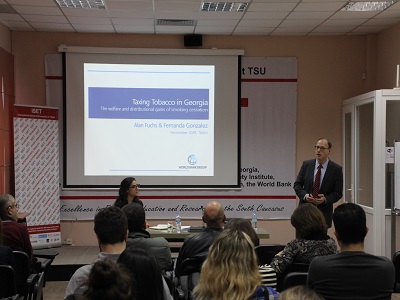On November 19, ISET was visited by Mr. Alan Fuchs of the World Bank Group, whose presentation, 'Taxing Tobacco in Georgia: The welfare and distributional gains of quitting smoking’, delved into the welfare and distributional impact of increasing taxes on tobacco in Georgia.
A large portion of Georgia’s population smoke, despite its long-proven negative health effects; approximately eight million deaths per year are attributed to tobacco consumption. As Mr. Fuchs stated, Georgia faces significant health, economic and social costs due to the prevalence of cigarette smoking.
Mr. Fuchs’ presentation examined how raising taxes on tobacco products can be an effective way of reducing smoking. The World Bank used an Extended Cost-Benefit Analysis (ECBA) method to simulate the welfare and distributional impact of raising the price of cigarettes, which showed that poorer households have a tendency to reduce their tobacco consumption when faced with higher prices of cigarettes. However, although the same ECBA method was used by the World Bank in similar studies in Russia, Chile, South Africa, Myanmar and Indonesia, the studies differed according to the datasets available. In some countries (such as Russia and South Africa) the datasets were widespread and informative, but others (including Georgia) were far less complete, making the results somewhat less reliable.
Mr. Fuchs’ presentation is particularly timely since smoking is on the rise in the developing world. This is partly due to the fact that anti-smoking regulations are comparatively lax in the developing world, but this makes it a good place for the tobacco industry to invest in. Due to the large numbers of Georgians who smoke, it was an illuminating lecture to listen to for the ISET community, and the institute is grateful to Mr. Fuchs for visiting once again.











